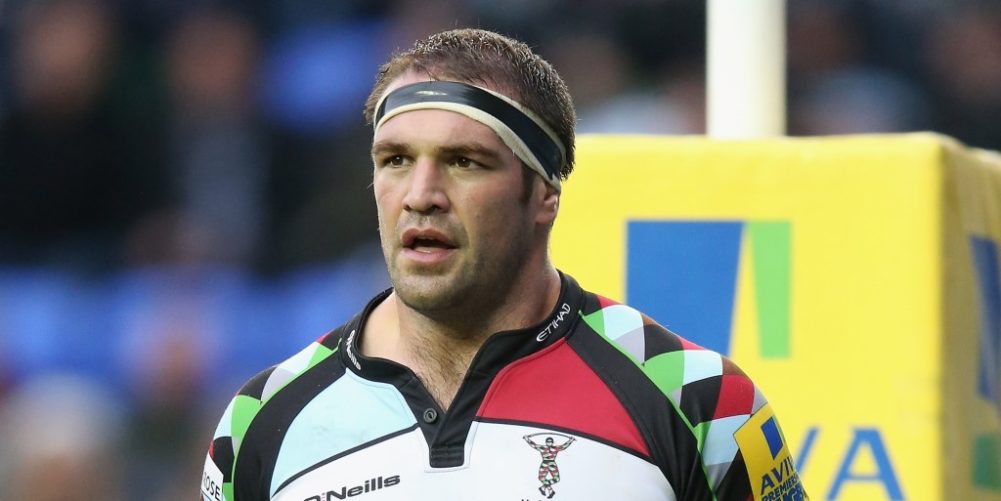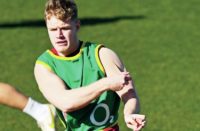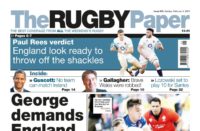The Six Nations has never been short on journeys of a miraculous nature but this one might just trump them all, from its murderous start to its thunderous finish.
It began at the height of the Second World War in the Slovakian town of Zilina with the Nazis herding the Jewish population into trains taking them to a place in Poland called Auschwitz.
Josef Kohn's relatives perished there and this story, like millions of others told down the years, would have ended in 1942 had the young Dr Kohn not escaped from another concentration camp. He made it all the way to England, settled in Shropshire and opened a practice in Whitchurch.
He married a local girl, Mary. A generation or so later, their son, Simon, married Sheri in Bristol where the eldest of their three boys, Oliver, was born almost 40 years ago. He grew up to be a ‘big, hairy-arsed' rugby player, good enough to hack it at professional level for 12 years at Plymouth, Bristol and, most notably, Harlequins.
For at least 11 of those years nobody in the Welsh game paid a blind bit of notice. Not even the Welsh Exiles, renowned for their detective work on the genealogical front, knew of his eligibility, leaving the path clear for someone else to make the connection.
Two strange events conspired to make Olly Kohn the one and only international rugby player to be discovered on social media. His fellow Harlequin, Ugo Monye, put out a tweet revealing Kohn's ancestral link to Wales traced back to his maternal grandmother.
And that, most conveniently, appeared shortly before an acute shortage of fit second rows left Wales in some danger of losing the Six Nations title they had won in Grand Slam style the previous season. The list of crocked locks for the opening match, against Ireland at home, left them without Alun-Wyn Jones, Luke Charteris, and Bradley Davies.
Monye's tweet would have arrived in the Welsh camp as technological manna from heaven. Once the relevant facts had been checked with the man himself, that his granny really did come from Fleur de Lys in the Rhymney Valley, Kohn suddenly found himself on the Test stage at an age when all realistic hope of getting there via England had long gone.
While one uncapped lock, Andrew Coombs from the Dragons, started, the other waited for the nod which eventually came with Wales running out of time to recover from a costly start against Ireland. Kohn had seven minutes and those seven minutes turned out to be all he would ever get.
His prospects of at least seven more, maybe longer, in the next match against France vanished when he pulled a hamstring a few hours before Wales flew to Paris. Kohn recovered only to damage his shoulder badly enough the following season to end his career at 32.
Fortunately, he had already been dabbling in a new one, making sausages and bacon. Along with younger brothers Max and Josh, the Bristol-based Kohns now run a thriving sausage and bacon business, The Jolly Hog, as well as their own restaurant, The Pigsty.
For all the brevity of his on-field action with Wales, it turned out to be long enough to win a Six Nations medal, presented to him on the night of Saturday nights in Cardiff when England, one win away from a Slam, went to pieces, losing by a record margin of 3-30.
“I don't think I've ever felt an atmosphere like it,'' Kohn says. “It felt like a game Wales were never going to lose. The ground was buzzing long before kick-off. It was unbelievable.
“I was very lucky to have been able to play a part with a great group of lads in a successful squad that season, even a very small part. Playing for Wales against Ireland that year was an awesome experience, completely unexpected at such a late stage of my career.''
None of it would have been possible had his paternal grandfather, Josef Kohn, not survived the German occupation of what is now Slovakia. “All of his family died in Auschwitz,'' says Kohn. “My grandfather had been put in prison at a time when they (the Nazis) were starting to Ayranise the whole of Zilina.
“Loads of families were being bundled onto trains out of the town. Josef escaped by skiing over the mountains. He managed to get a fake passport and find his way to England.
“He'd been a doctor specialising in massage before the war and he set up practice in Shropshire. I grew up in Bristol and for most of my time in rugby people heard my name and thought I was of German ancestry.
“I was never on anyone's radar until after a Harlequins match against North- ampton shortly before the Six Nations in 2013, and then only by chance. My dad was talking to Ugo Monye and he told Ugo about our family heritage.
“The upshot of that was that Ugo tweeted something like: ‘Hashtag Kohn for Wales'. The next day I got a phone call from Rob Howley, then in charge as head coach with Warren Gatland on a sabbatical with the Lions. Before I knew it, I'd been called up. Ugo still claims that he got me my Welsh cap.''
Kohn's immersion in the sausage and bacon business prevented him from returning to the scene of his entire Test career for Wales-France
yesterdayand watching six of those who played alongside him seven years ago: Leigh Halfpenny, George North, Dan Biggar, Taulupe Faletau, Ken Owens, Justin Tipuric.
“I love the game although I don't watch it a lot now,'' Kohn says. “I can't get to any of the Six Nations matches but being able to play for Wales, just that once, and being presented with a medal after the England match is something I'll never forget.
“I was really proud to have been a small part of something special. At the end I went into both dressing rooms. I knew some of the England players really well, like Chris Robshaw, and so I saw it from both sides. It was quite a surreal day.''
Not as surreal, though, as the journey which took him there over three score years and ten, from Zilina to Cardiff.

























